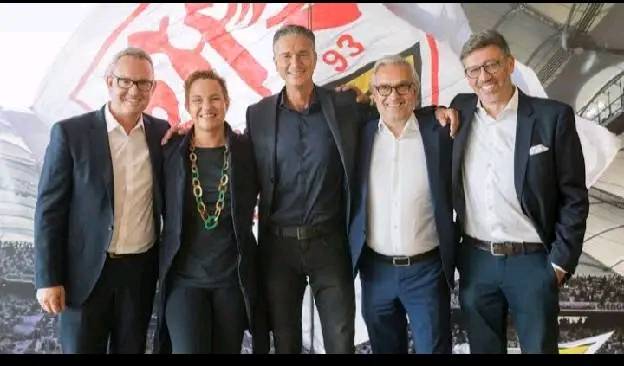The news of a record-breaking sponsorship deal has set Stuttgart ablaze with excitement and turned the Bundesliga landscape upside down. VfB Stuttgart, a club steeped in tradition and history, has landed a mega-contract worth over 100 million euros, one of the largest financial injections in its long and illustrious journey. This agreement is more than just numbers on paper—it is a declaration of intent, a signal to rivals, and a dream come true for fans who have endured the ups and downs of recent years. With this deal, Stuttgart is no longer just a competitor in the Bundesliga; it has the potential to rise into an entirely new dimension and position itself as a serious force for the future.
The impact of such a contract cannot be overstated. For years, Stuttgart has navigated the fine line between tradition and modernity, between being a club that honors its roots and one that must adapt to the ever-evolving business of global football. The financial muscle that comes with a deal of this magnitude opens the doors to a new era of competitiveness. The management can now dream bigger, set more ambitious targets, and push the club beyond the role of an underdog. Suddenly, the narrative of Stuttgart as a secret favorite is not far-fetched—it is within reach, and rivals are already beginning to feel the tremors.
The Bundesliga has always been a league defined by balance. Bayern Munich has long stood as the giant, but other clubs such as Borussia Dortmund, RB Leipzig, and Bayer Leverkusen have consistently sought to challenge the dominance. Stuttgart, for much of its modern history, has moved between those tiers, at times battling for survival, and at other moments celebrating glory. The new sponsorship deal transforms the landscape entirely. With over 100 million euros entering the club’s coffers, Stuttgart is armed with the resources to build a squad capable of challenging on all fronts. From strengthening the first team to investing in infrastructure, youth development, and international marketing, the scope is vast.
Fans of Stuttgart have responded with unbridled passion. The news has spread like wildfire through the city, reigniting the pride of a fanbase that has stood by its team through relegations, promotions, and unforgettable triumphs. For supporters, this moment feels like a validation of their loyalty and a promise of better days ahead. They see not just the financial numbers but also the dreams attached: the chance to compete for Bundesliga titles, to stand toe-to-toe with the league’s powerhouses, and perhaps even to conquer Europe. The Mercedes-Benz Arena is already buzzing with anticipation, and the atmosphere is expected to reach fever pitch in the coming matches.
The players, too, cannot help but feel the weight of this shift. When a club secures such an injection of resources, it sends a clear message to the dressing room: Stuttgart is aiming higher than ever before. This creates both opportunity and pressure. On one hand, the players already wearing the jersey know they are part of something historic and have the chance to etch their names into club folklore. On the other hand, competition for places will intensify as the club inevitably attracts higher-profile signings. This dual reality could spark extraordinary performances, as each player pushes themselves to be part of Stuttgart’s new golden era.
For head coach Sebastian Hoeneß, the challenge is equally exciting and daunting. With financial backing of this level, the expectation naturally grows. He now has the tools to demand more from his squad, to shape the roster in line with his vision, and to dream beyond the limitations that often restrict clubs outside the financial elite. Hoeneß’s tactical acumen has already made him a beloved figure among fans, but now he must prove he can convert resources into silverware. Managing a talented, ambitious squad and balancing the expectations of supporters, management, and sponsors will test every facet of his leadership.
Economically, the sponsorship deal positions Stuttgart as one of the best-prepared clubs in Germany. Beyond immediate transfers and squad reinforcement, the money allows for long-term investment. The youth academy, one of Stuttgart’s proudest assets, could receive a major boost, ensuring that the club continues to produce homegrown stars for years to come. Facilities can be upgraded, scouting networks expanded, and global partnerships established. In today’s football, where branding and international reach are as vital as results on the pitch, Stuttgart can now expand its presence beyond Germany, connecting with fans across Europe, Asia, and the Americas.
Rivals in the Bundesliga have already taken notice. A Stuttgart side with this kind of power cannot be underestimated. Clubs like Dortmund and Leipzig, who have built reputations as challengers to Bayern, now see Stuttgart joining the same ranks. For Bayern Munich, it is both a warning and a motivator. The Bavarian giants have thrived in part because challengers often lacked the staying power to compete financially over multiple seasons. Stuttgart, backed by a 100-million-euro injection, has the potential to sustain its rise, making the league more competitive and unpredictable. This could herald a golden era for the Bundesliga as a whole, with multiple teams battling for supremacy, drawing global attention and boosting the league’s profile worldwide.
Experts, however, have offered words of caution amid the euphoria. Football history is filled with examples of clubs that received financial windfalls but failed to translate them into lasting success. Money, while crucial, is only one ingredient in the recipe for glory. Strategic planning, wise investment, and maintaining harmony within the squad are equally important. If Stuttgart manages its resources prudently, avoids reckless spending, and builds systematically, the future could indeed be bright. But if expectations spiral out of control and the club loses focus, the opportunity could slip away. This balance will define whether Stuttgart becomes a true Bundesliga powerhouse or merely enjoys a fleeting moment of glory.
One cannot underestimate the psychological effect this news has on the players and staff. Knowing that the club believes in its project enough to secure such backing creates a sense of unity and ambition. Suddenly, Stuttgart is no longer content with being in the middle of the table or merely qualifying for Europe; the horizon has expanded to include championships. This change in mentality could be the decisive factor that transforms a promising squad into a title-winning one.
For the city of Stuttgart itself, the deal is a source of pride. The club has always been a symbol of the city, and now it carries the promise of putting Stuttgart back on the global football map. The local economy will likely benefit as well, with increased attendance, merchandise sales, tourism, and international exposure. When a football club thrives, the entire community feels the ripple effects. Businesses around the stadium, local sponsors, and even city infrastructure projects stand to gain momentum from the heightened attention and activity.
Looking ahead, the possibilities are thrilling. Imagine Stuttgart lifting the Bundesliga trophy in the coming years, powered by both tradition and modern investment. Picture the club making deep runs in the Champions League, filling stadiums across Europe with traveling fans clad in white and red. The dream is no longer confined to nostalgia for past triumphs; it is a realistic vision for the future. Stuttgart could become the model of how a traditional club can adapt, survive, and thrive in the modern game without losing its soul.
At the heart of all this remains the bond between the club and its supporters. Money can buy players, facilities, and prestige, but it cannot buy loyalty or passion. Stuttgart’s fans have shown for decades that their love for the club is unconditional. Now, with resources to match their dreams, that passion could propel the team to heights unseen in a generation. The south stand of the Mercedes-Benz Arena, already one of the most atmospheric in the Bundesliga, could become the beating heart of a new powerhouse, pushing the team on to victory after victory.
In the grand narrative of German football, Stuttgart’s sponsorship deal feels like the opening chapter of a thrilling new era. It challenges the old order, injects fresh energy into the Bundesliga, and gives fans across the country a reason to believe in greater parity and competition. For Stuttgart, it is nothing less than a revolution—financially, emotionally, and sportingly. The quake has already been felt across Germany, and the aftershocks are sure to reverberate for years to come.
The question that remains is simple yet profound: can Stuttgart turn this financial windfall into lasting dominance? If the club answers with wise decisions, patient building, and relentless ambition, the Bundesliga could witness the birth of a new giant. The stage is set, the resources are secured, and the fans are ready. Stuttgart, once again, stands on the brink of greatness, armed with the power to change the destiny of German football. The rivals are watching closely, the experts are debating, and the supporters are dreaming. One thing is certain: the Bundesliga will never be the same again.



